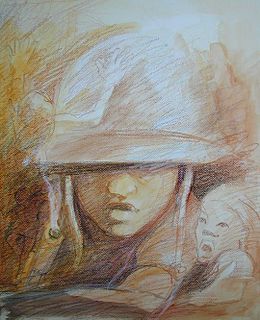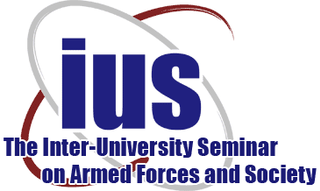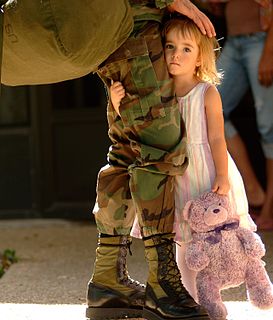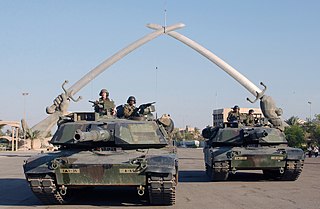 W
WMilitary sociology is a subfield within sociology. It corresponds closely to C. Wright Mills's summons to connect the individual world to broader social structures. Military sociology aims toward the systematic study of the military as a social group rather than as a military organization. This highly specialized sub-discipline examines issues related to service personnel as a distinct group with coerced collective action based on shared interests linked to survival in vocation and combat, with purposes and values that are more defined and narrow than within civil society. Military sociology also concerns civil-military relations and interactions between other groups or governmental agencies.
 W
WThe Center on Conscience & War (CCW) is a United States non-profit anti-war organization located in Washington, D.C. dedicated to defending and extending the rights of conscientious objectors. The group participates in the G.I. Rights Hotline, and works against all forms of conscription. There are no charges for any of CCW's services.
 W
WChildren in the military are children who are associated with military organisations, such as state armed forces and non-state armed groups. Throughout history and in many cultures, children have been involved in military campaigns. For example, thousands of children participated on all sides of the First World War and the Second World War. Children may be trained and used for combat, assigned to support roles such as porters or messengers, or used for tactical advantage as human shields or for political advantage in propaganda.
 W
WCivil–military relations describes the relationship between civil society as a whole and the military organization or organizations established to protect it. CMR incorporates a diverse, often normative field, which moves within and across management, social science and policy scales. More narrowly, it describes the relationship between the civil authority of a given society and its military authority. "The goal of any state is to harness military professional power to serve vital national security interests, while guarding against the misuse of power that can threaten the well-being of its people." Studies of civil-military relations often rest on a normative assumption that it is preferable to have the ultimate responsibility for a country's strategic decision-making to lie in the hands of the civilian political leadership rather than a military.
 W
WA commander-in-chief or supreme commander is the person who exercises supreme command and control over an armed forces or a military branch. As a technical term, it refers to military competencies that reside in a country's executive leadership, a head of state or a head of government.
 W
WCompulsory military training (CMT), a form of conscription, was practised for males in New Zealand between 1909 and 1972. Prior to and after this period military training in New Zealand has been voluntary.
 W
WA conscientious objector is an "individual who has claimed the right to refuse to perform military service" on the grounds of freedom of thought, conscience, or religion.
 W
WA conscription crisis is a public dispute about a policy of conscription, or mandatory service in the military, known in US English as a "draft". A dispute can become a crisis when submission to military service becomes highly controversial and popular revolt ensues. From the point of view of military officials, the crisis is one of supply; where they may claim to lack enough troops to accomplish a military objective, and have, to some degree, lost control of their political ability to enforce existing conscription law.
 W
WChildren in the military are children who are associated with military organizations, such as state armed forces and non-state armed groups. Throughout history and in many cultures, children have been involved in military campaigns. For example, thousands of children participated on all sides of the First World War and the Second World War. Children may be trained and used for combat, assigned to support roles such as porters or messengers, or used for tactical advantage as human shields or for political advantage in propaganda.
 W
WThe Inter-University Seminar on Armed Forces and Society (IUS) is a professional organization and forum for the exchange and evaluation of research on military institutions, civil-military relations, and military sociology with a broad emphasis across the social and behavioral sciences. The IUS is intended to be interdisciplinary in nature and has around 600 fellows in over 35 countries, who hold varying occupations in the military, academia, and the private sector.
 W
WInterservice rivalry is the rivalry between different branches of a country's armed forces, in other words the competition for limited resources among a nation's land, naval, and air forces. The term also applies to the rivalries between a country’s intelligence services, or between the police and fire services of a city, such as the NYPD and FDNY.
 W
WMilitary service of intersex people varies greatly by country. Some armed forces such as the Australian fully embrace intersex people in modern-day while others have vague rules or policies or treat the subject on a case by case basis, such as the United States.
 W
WMilitarism is the belief or the desire of a government or a people that a state should maintain a strong military capability and to use it aggressively to expand national interests and/or values. It may also imply the glorification of the military and of the ideals of a professional military class and the "predominance of the armed forces in the administration or policy of the state".
 W
WA military brat is the child of serving or retired military personnel. Military brats are associated with a unique subculture and cultural identity. A military brat's childhood or adolescent life may be immersed in military culture to the point where the mainstream culture of their home country may seem foreign or peripheral. In many countries where there are military brat subcultures, the child's family moves great distances from one non-combat assignment to another for much of their youth. For highly mobile military brats, a mixed cultural identity often results, due to exposure to numerous national or regional cultures.
 W
WIn the United States, a military brat is the child of a parent or parents serving full-time in the United States Armed Forces, whether current or former. The term military brat can also refer to the subculture and lifestyle of such families.
 W
WMilitary service is service by an individual or group in an army or other militia, whether as a chosen job (volunteer) or as a result of an involuntary draft (conscription).
 W
WNuremberg and Vietnam: An American Tragedy is a book written by Telford Taylor, the Chief Counsel Prosecutor at the Nuremberg Trials.
 W
WMilitary or belligerent occupation, often simply occupation, is effective provisional control by a ruling power over a territory, without a claim of formal sovereignty. The territory is then known as the occupied territory and the ruling power the occupant. Occupation is distinguished from annexation by its intended temporary nature, by its military nature, and by citizenship rights of the controlling power not being conferred upon the subjugated population.
 W
WPost-traumatic stress disorder (PTSD) is a mental disorder that can develop after a person is exposed to a traumatic event, such as sexual assault, warfare, traffic collisions, child abuse, or other threats on a person's life. Symptoms may include disturbing thoughts, feelings, or dreams related to the events, mental or physical distress to trauma-related cues, attempts to avoid trauma-related cues, alterations in how a person thinks and feels, and an increase in the fight-or-flight response. These symptoms last for more than a month after the event. Young children are less likely to show distress, but instead may express their memories through play. A person with PTSD is at a higher risk of suicide and intentional self-harm.
 W
WOn Red Hand Day or the International Day against the Use of Child Soldiers, February 12 each year since 2002, pleas are made to political leaders and events are staged around the world to draw attention to child soldiers: children under the age of 18 who participate in military organizations of all kinds. The aim of Red Hand Day is to call for action to stop this practice, and for support for children affected by it.
 W
WThe rehabilitation and reintegration of child soldiers is defined by Child Soldiers International as:"The process through which children formerly associated with armed forces/groups are supported to return to civilian life and play a valued role in their families and communities"
 W
WUnrooted Childhoods: Memoirs of Growing up Global is a book of memoirs of people who grew up in multiple countries, or moving frequently between distant regions within the same country, also known as third culture kids, and is edited by Faith Eidse and Nina Sichel. It documents the life of growing up in multiple nations, cultures, and language-regions by weaving the individual memoirs of notable and also unknown writers, notables include Eidse, Sichel, Isabel Allende, Marie Arana, Pat Conroy, Pico Iyer, and many others into one book. It was published in 2003.